


















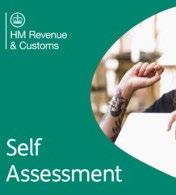



Charlie
Syed

Grace
Bea
Habib

Mohammed
Khalid
Muhammad
Passengers will be boarding the world’s first fully sized, self-driving bus service in Edinburgh from the Spring, after it was awarded a share of £81 million in joint UK government and industry support for self-driving transport technology.
The project is one of seven successful projects from around the UK, and forms the most advanced set of commercial, self-driving passenger and freight operations anywhere in the world. The grants, part of the Centre for Connected and Autonomous Vehicles Connected and Automated Mobility programme, will help British companies seize early opportunities to develop experimental projects into offerings ready for the market.
The joint government and industry funding winners are:

► CAVForth II – Fusion Processing –£10.4 million to launch the world’s first operational, full-sized, selfdriving bus service, in Edinburgh, with Stagecoach and Alexander Dennis
► V-CAL – North East Automotive Alliance – £8 million to roll out selfdriving and remotely piloted HGVs between the Vantec and Nissan sites in Sunderland
► Hub2Hub – HVS – £13.2 million to develop a new, zero emissions, selfdriving HGV with Asda
► Sunderland Advanced Mobility Shuttle – City of Sunderland Council – £6 million to build and trial a self-driving shuttle service to the University of Sunderland and the Sunderland Royal Hospital
► Project Harlander – Belfast Harbour
– £11 million to deploy a self-driving shuttle service around Belfast Harbour
► Multi-Area Connected Automated Mobility – Conigital – £15.2 million to establish a remote driving control hub, to oversee self-driving vehicles operating in Solihull and Coventry, with the NEC and local councils.
► Project Cambridge Connector –
Greater Cambridge Partnership –£17.4 million to trial on-demand, self-driving taxis, to complement existing transport services in parts of Cambridge
£42 million in government funding is being matched by industry.
Business Secretary Grant Shapps said:
In just a few years’ time, the business of self-driving vehicles could add tens of billions to our economy and create tens of thousands of jobs across the UK. This is a massive opportunity to drive forward our priority to grow the econ-
omy, which we are determined to seize. The support we are providing today will help our transport and technology pioneers steal a march on the global competition, by turning their bright ideas into market-ready products sooner than anyone else.
Transport Secretary Mark Harper said:
Self-driving vehicles including buses will positively transform people’s everyday lives – making it easier to get around, access vital services and improve regional connectivity. We’re supporting and investing in the safe rollout of this incredible technology to help maximise its full potential, while also creating skilled jobs and boosting growth in this important sector. Almost £600,000 is also being awarded for feasibility studies, looking into how self-driving technology could improve public transport in four parts of the UK. These projects will look into potential routes where automated vehicles could operate exclusively from other traffic, to relieve congestion on the A414 through Hertfordshire and Essex, parts of Eastern Cambridge, Birmingham and Solihull, and Milton Keynes.
Innovate UK Executive Director for Net Zero, Mike Biddle, said: The Connected and Automated Mobility (CAM) sector is of crucial importance to the UK, with the potential to
deliver safer, cleaner and more efficient transport systems across a wide range of settings.
This latest, multi-year round of government’s Commercialising CAM funds builds on the success of previous collaborative R&D programme, stimulating innovation to ensure the UK is at the forefront of the transition towards the commercialisation of self-driving services.
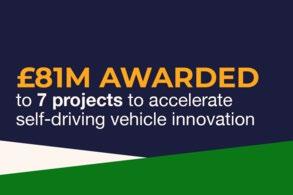

Self-driving vehicles could revolutionise public transport and passenger travel, especially for those who don’t drive, better connect rural communities and reduce road collisions caused by human error. Forecasts predict that by 2035, 40% of new UK car sales will have self-driving capabilities, with a total market value for connected and automated mobility worth £41.7 billion to the UK. This could create nearly 40,000 skilled jobs in connected and automated vehicle (CAV) technology.
The government is also committed to introducing legislation that will enable the safe and timely rollout of self-driving vehicles on UK roads. Under a proposed ‘safety ambition’ for self-driving vehicles to be equivalent in safety to a competent and careful human driver, vehicles will need to meet certain standards to be allowed to ‘self-drive’ on the roads throughout the lifetime of the vehicle. Organisations overseeing selfdriving vehicles could face sanctions if standards are not maintained.
A record 11.7 million customers submitted their tax returns on time, HM Revenue and Customs (HMRC) has revealed.
On 31 January, 861,085 customers filed online to meet the deadline, some with minutes to spare. There were 36,767 customers who filed in the last hour before the deadline, but the peak hour for filing on the day was 16:00 and 16:59, when 68,462 customers submitted their tax return.
More than 12 million customers were expected to file a Self Assessment tax return for the 2021 to 2022 tax year. HMRC is urging customers who missed the deadline to submit theirs as soon as possible or risk facing a penalty.
Search ‘pay my Self Assessment’ on GOV.UK to find out more.

The Self Assessment payment deadline was also 31 January. If customers are yet to pay any outstanding tax, HMRC is urging them to do so as soon as possible. There are many ways for customers to pay, including online, using the HMRC app, by bank transfer, or at their bank. Payment options are listed at GOV.UK.


Customers can plan ahead for their 2022 to 2023 tax bill and set up a regular payment plan to help spread the cost. HMRC’s Budget Payment Plan enables customers who are up to date with previous payments to make regular weekly or monthly contributions towards their next tax bill.
A Budget Payment Plan is different from payments on account, which are usually due by midnight on 31 January and 31 July.
Customers need to be aware of the risk of falling victim to scams and should never share their HMRC login details with anyone, including a tax agent, if they have one. HMRC scams advice is available on GOV.UK.
The independent interim evaluation report found that the West Midlands economy received a significant boost, with over half the economic impact generated (£453.7 million**) benefiting businesses and communities across the region.
A record 1.5 million tickets were sold for Birmingham 2022, the largest multisport event hosted in England in the last 10 years.
Held between 28 July and 8 August 2022, the Games brought together 6,600 athletes and team officials from across 72 Commonwealth nations and territories.

Sports Minister Stuart Andrew said: “Birmingham 2022 was tremendously successful in boosting the local economy and bringing people together. This report shows that new jobs and investments are just the beginning of the story, with the Games paving the way for future events in the region.
“The Games put the West Midlands on the global stage, and provided the region with world-class facilities. Thanks to Birmingham 2022, the city now has the industry know-how and venues to host the European Athletics Championships in 2026.
“Diversity and inclusion was at the heart of the ‘Friendly Games’, with the first fully integrated pride programme, more medals for women than men and the biggest para-sport programme in Commonwealth Games history.”
Since Birmingham was awarded the Games in 2017, the event has created roughly 15,410 years of employment in the UK. Over summer 2022, this equated to more than 9,000* full time equivalent jobs. Birmingham 2022 also delivered 5,188 weeks of apprenticeships, 2,000 work experience placements and training for 14,075 members of the Commonwealth Collective of volunteers who contributed 1.25 million hours of their time. The interim report sets out benefits the Games has had on local businesses and volunteers. Almost three quarters of local businesses surveyed said they had secured new investments thanks to Games contracts. And Commonwealth Collective volunteers said participating in the
Games had increased feelings of inclusion, pride and wellbeing.
Cllr Ian Ward, Leader of Birmingham City Council, said: “As this report makes clear, the Birmingham Commonwealth Games provided a huge and timely boost for Birmingham, the West Midlands and the United Kingdom.
“The Games were just the start of Birmingham’s Golden Decade of Opportunity, providing a springboard for further success, and these findings underline why the bold decision by the council to lead the bid for the Games was the right one.
“Birmingham 2022 was always about much more than 11 days of sport and our focus is now firmly upon realising the long-term legacy that being the Proud Host City will enable. The council will continue working with partners to ensure that the people and communities of Birmingham and the wider region continue to be Commonwealth Games winners for years to come.”
Sir John Crabtree, outgoing Chair of Birmingham 2022, said: “One of the key parts of our Birmingham 2022 mission was to help the region to grow and succeed, an ambition which took on even greater significance following the impact of the global pandemic. This report, which outlines a beneficial boost for the West Midlands economy, is evidence that the Games successfully achieved this aim, and this is further demonstrated by the figures for employment, with approximately 7,440 net full-time equivalent jobs supported at the peak of the Games.
“It has been an incredible honour to lead the organisation of such an important event for the West Midlands and, as the Birmingham 2022 Commonwealth Games Organising Committee nears the end of its journey, we would like to thank all of our partners for their support and contributions which helped to make the Games so successful and secured such a sizeable economic impact for the host city and region.”
Geoff Thompson, outgoing Deputy Chair of Birmingham 2022, said: “This report clearly highlights once again the value of staging major sports events. This part
of the country now has a fantastic opportunity to build on the success of the Birmingham 2022 Commonwealth Games, especially as taking centre stage during the summer really helped to further raise the global profile of Birmingham, the West Midlands and beyond – socially, culturally and economically. In particular the sport and physical activity opportunities for young people and communities will continue to see an equitable, diverse and inclusive legacy realised for all.”
The Games also had an impact on the region’s global reputation, pride in the West Midlands and community cohesion. Based on interviews with locals, the Games has provided a focal point for residents to come together and feel part of the events, as well as encouraging West Midlands residents to visit areas they would not otherwise have visited.
Birmingham 2022 events had an estimated total global TV viewership of 834.9 million, over 215 million digital views, 141 million interactions on social media and generated significant positive media coverage.
Thanks to the Commonwealth Games, Birmingham and the West Midlands have benefited from a new aquatics centre in Sandwell, the redevelopment of Alexander Stadium and wider regeneration projects in Perry Barr including a brand new train station.
Paul Blanchard, CEO, Commonwealth Games England said: “It’s fantastic to see the impact Birmingham 2022 has had on the West Midlands and the nation. We saw the excitement the Games brought to the athletes with some hugely memorable moments and the millions of spectators who engaged. Now, to see the lasting impact is great, particularly the development into sport facilities and equipment in the region to inspire the next generation of English talent.”
The Games was delivered within a budget of £778 million and the UK government has announced that it will invest over £60 million of unspent contingency funding from this core budget in the West Midlands to further enhance the legacy of the Games.
Myrtle Lloyd, HMRC’s Director General for Customer Services, said:
“
Thank you to the millions of customers and agents who got their tax returns in on time.
Customers who have yet to file, and who are concerned that they will not be able to pay in full, may be able to spread the cost of what they owe with a payment plan.

A £1 million fund for new ideas to boost health and welfare at work for Small and Medium Enterprises (SMEs) and the self-employed was launched today. Successful bidders will receive up to £100,000 to back their projects from 19 May 2023, with the Government looking for innovative solutions to drive better access for SMEs and the self-employed to Occupational Health (OH) services. Applicants are being encouraged to demonstrate how they would deliver improvements to OH, harnessing technology such as artificial intelligence or data collection, to deliver better health outcomes for employees of SMEs. Better health provision for staff helps employers look after their workforce, meaning more are likely to stay in work. While larger employers often have better access to OH services, for smaller businesses and the self-employed the lack of support for people with health needs can potentially lead to more people becoming economically inactive.
Applications can be from those who work alone or with others from business, research organisations, research and technology organisations or the third sector, with the Government looking for proposals to:
1. Discover new and innovative ways for the OH market, which supports people to stay well in work, to deliver services that drive better access for SMEs and self-employed
2. Discover new and innovative ways that the OH market can deliver services and better serve the demand for OH
3. Deliver innovations that can be scaled up for businesses to have an impact in the OH market through new services and better use of technology
The competition is a joint venture between the Department for Work and Pensions (DWP) and The Department for Health and Social Care (DHSC), as part of the Joint Work and Health Unit, and in conjunction with Innovate UK, an arm of UK Research and Innovation. The fund
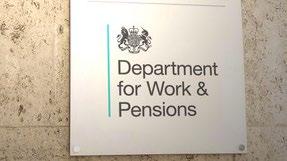
The move is an expansion of ongoing work by the Competition and Markets Authority (CMA) into ‘greenwashing’, which seeks to get to the bottom of whether products and services that claim to be green or eco-friendly are being marketed to shoppers accurately.
The CMA’s review will examine a wide range of products known as ‘fast-moving consumer goods’ (FMCG). These are essential items used by people on a daily basis and repurchased regularly, such as food and drink, cleaning products, toiletries, and personal care items.
In 2021, the average household spent almost £70 a week on food and drink alone, and the FMCG sector as a whole is worth over £130 billion annually.
The CMA will analyse environmental claims made about such products – both online and in store – to consider whether companies are complying with UK consumer protection law. Concerning practices could include the use of vague and broad eco-statements for example packaging or marketing a product as ‘sustainable’ or ‘better for the environment’ with no evidence; misleading claims about the use of recycled or natural materials in a product and how recyclable it is; and entire ranges being incorrectly branded as ‘sustainable’.
Sarah Cardell, Chief Executive of the CMA, said:
These products are the essentials on everyone’s shopping lists: food and drink, shampoo, laundry detergent, toothpaste, cleaning products. As more people than ever try to do their bit to help protect the environment, we’re concerned many shoppers are being misled and potentially even paying a premium for products that aren’t what they seem, especially at
a time when the cost of living continues to rise.
Our work to date has shown there could be greenwashing going on in this sector, and we’ll be scrutinising companies big and small to see whether their environmental claims stack up. Now is a good time for businesses to review their practices and make sure they’re operating within the law.
The move comes as part of the CMA’s ongoing work into misleading green claims. In January 2022, the CMA turned its eye to the fashion sector, launching enforcement action against well-known fashion brands ASOS, Boohoo and George at Asda in July last year. The CMA wrote to the 3 firms outlining its concerns and the investigation is ongoing.
The CMA also produced the Green Claims Code – a guide to help businesses understand how to communicate their green credentials, while avoiding the risk of misleading shoppers. How the review develops will depend on the CMA’s assessment of the evidence before it. If the CMA uncovers evidence suggesting green claims could be unfounded, it will consider taking enforcement action using its formal powers – for example, opening an investigation into specific companies.
In its Annual Plan consultation 2023 to 2024, the CMA detailed its strategic priority to continue to take action to accelerate the transition to a net zero economy and promote environmental sustainability.
More information can be found on the CMA’s Fast Moving Consumer Goods investigation page.
will be open to applications from 30 January 2023 and run until 15 March 2023. Minister for Disabled People, Health and Work, Tom Pursglove MP, said: Good occupational health within workplaces is vital in supporting our overall health and standard of living. We spend so much of our lives at work, and it is imperative that our employers can give
us the support we need to maintain our physical and mental health. This in turn means we can give our best at work. Through the launch of our new £1 million fund, I look forward to seeing innovative, workable solutions to help SMEs deliver the best for their employees, creating healthier, welfare-driven working environments that will ultimately drive
growth and improve people’s working lives.
The new Fund to Stimulate Innovation in Occupational Health (OH) competition will be delivered in the form of a Small Business Research Initiative, a well-established, output driven funding tool run by Innovate UK.
Minister for Care, Helen Whately, said:
This new £1 million fund will help us find better ways to support the health of our workforce – especially looking at small businesses and the self-employed. Making sure people stay well enough to work is so important – it means a bigger workforce, boosted productivity, and better quality of living.
Successful bidders will look at innovative new ways to support people in their field of work, help them to live healthier, happier lives while driving growth in our economy.
Eight swimming pools in Birmingham have signed up with swimming products recycling scheme Leisure Loop, which aims to address the amount of waste generated by pools that reaches landfill each year.
The leisure centres taking part in this green initiative are Beeches, Cocks Moors Woods, Erdington, Fox Hollies, Ladywood, Northfield, Stechford and Wyndley.
Birmingham Community Leisure Trust, which runs the centres in partnership with Serco Leisure, is teaming up with swimming products company Zoggs to offer a trial of Leisure Loops’ re-cycling boxes. All boxes will be Zoggs-branded to make it easy for customers to identify where to put their old swimming products, such as goggles, flip-flops and floats.
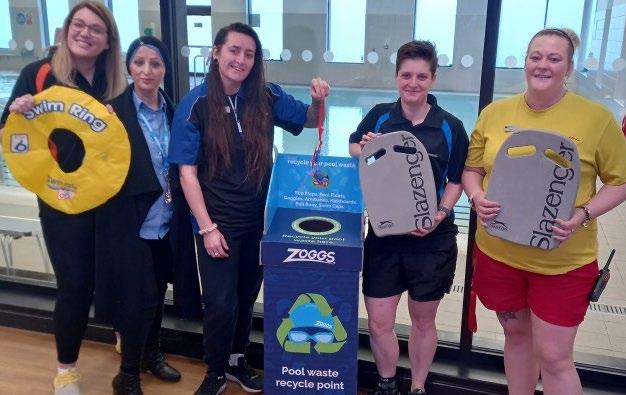
Jack Pyatt, Partnership Manager
for the trust said: “This is an important initiative and one I’m sure our customers will be keen to support. We’re determined as an operator to do all we can to reduce our environmental impact and this scheme fits in perfectly with our commitment to Maintain a Fitter Future, a green project we launched at all centres in 2022 to demonstrate more transparency on how we use energy around our facilities.
“I would encourage all customers to look out for the blue Zoggs’ boxes at each of the centres, and to check out our websites for a full list of the items we are collecting. The waste we collect will be recycled and transformed into new products, and it’s worth noting that if every pool in the UK filled just one box, around 55 tonnes of waste would be prevented from reaching landfill.”
Cllr Mariam Khan, Cabinet Member for Health and Social Care added: “Our leisure centres are really popular and we know schemes like this can help residents to do their bit to help reduce waste and improve the environment. Bringing the boxes to our leisure centres will mean that local users can easily recycle their unwanted flip flops, goggles, floats and other swimming equipment.
“The council is doing a great deal of work to minimise waste and increase recycling and I am really pleased to welcome this scheme at our pools in Birmingham.”
Birmingham Community Leisure Trust and its operating partner, Serco Leisure run nine facilities in the city on behalf of Birmingham City Council.


The newly added section of Manchester Museum is the country’s first permanent museum devoted to the lives and history of South Asian populations in the UK. One of the many fascinating stories being presented in the newest permanent exhibition at Manchester Museum is about connections between South Asia and the NHS as well as the life of an innovative Indian physicist. The South Asia Gallery, a collaboration with the British Museum, is unique in that it was put together by a group of 30 inspirational people, ranging from singers and artists to community leaders and educators, to share personal stories that help open a window into South Asia and right in the middle of the exhibition hall is an area designated for performances, films, and other interactive events. The inaugural presentation in this space is a movie that examines mixed identities and ties to performance and music.
As a first-generation British-born South Asian, Nusrat Ahmed, the curator of the South Asia exhibit, said: “It is incredibly wonderful to be part of such a significant project.
“The co-curated South Asia Gal-
lery envisages a collaborative, iterative space that will generate new perspectives and connections.
“We hope to engage further diaspora communities on its opening and support its continual evolution.
“This personalised approach humanises the gallery, telling stories about real people and their objects.”
The 140 antique artefacts on display during the gallery’s launch, along with contemporary commissions and individual items owned by the collective’s members, have been organised into six overarching themes.
The Bose-Einstein condensate is a result of Prof. Bose’s collaboration with the theoretical physicist Albert Einstein in the field of quantum statistics. Prof. Bose, who gave his name to the class of subatomic particles known as “Bosons,” is perhaps best known for this study.
When a very low-density gas of bosons is cooled down to a temperature near absolute zero, the so-called “fifth” state of matter—where generally microscopic quantum mechanical events become visible on the macroscopic scale—typically emerges.
Commencing October 1st 2022, TTC 2000 Ltd, the leading UK provider of Police and Court referred Road Safety schemes, has been appointed to deliver speed awareness courses in the Metropolitan Police Service (the Met) London area on behalf of TfL, under the National Driver Offender Retraining Scheme (NDORS). Through this appointment, TTC’s comprehensive choice of both online and classroom-based speed awareness courses supports the London Mayor’s ambitious Vision Zero objective, which aims to eliminate all deaths and serious injury from London’s roads by 2041. As part of the Vision Zero strategy, TfL has been working with the Met to increase the level of police enforcement to tackle speeding and the harm it causes. TTC’s highly regarded speed awareness courses, to be delivered across the whole of Greater London, will support London’s Vision Zero plan
to reduce road danger, by educating drivers on the importance of driving within the speed limit. TTC’s data shows that its courses are an effective method of changing behaviour among drivers who have been caught speeding and are eligible to attend a course and improve driving standards in the long term. These courses are proven to reduce reoffending which helps to reduce risk on the roads. In 2021/2022, the Met enforced 476,685 speeding offences, 199,105 more than in the previous year and an increase of 72 per cent. Collision data from around the world shows that the speed at which people are driving or riding is the single most important factor in whether a crash takes place and how severely people are injured. The devastating impact speeding can have on local communities is why speed enforcement across London is so important for TfL and the police.
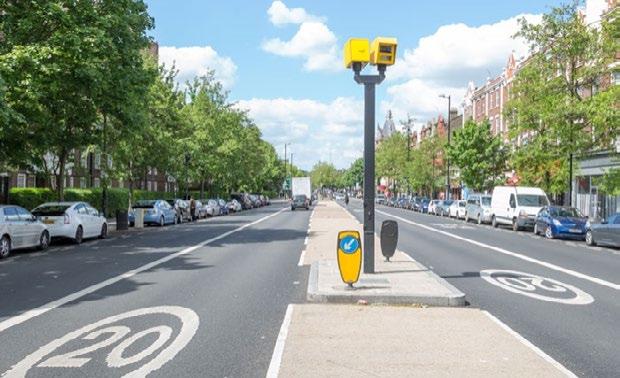
TTC will deliver courses via its citywide community of both online and classroom-based trainers, which is expanding in order to fulfil the increasing demand as a result of increased enforcement of speeding.
Sharon Haynes, Director of Client Services at TTC commented: “We are extremely proud to be working with Transport for London and the Metropolitan Police to deliver the National Driver Offender Speed Awareness Retraining Scheme across London. This scheme gives people the opportunity to be educated and improve their driving behaviour, which, in turn, saves lives.”
“TTC is grateful for the chance to support the London Mayor in his Vision Zero goals and together we can “eradicate deaths and serious injuries from our roads and make London a safer, healthier and greener place.” Added Sharon Haynes.
More funding to grow British exports by making it simpler for UK professionals to work abroad has been announced by the Business Minister Kevin Hollinrake in early February.

Grants of up to £75,000 will be awarded to UK regulators and
industry bodies to help them develop agreements with their international counterparts for UK professional qualifications to be recognised overseas.
This will make it easier for UK businesses to export their services worldwide.
Following the success of the first round of funding, which has supported work to boost the
presence of UK qualified professionals in accountancy, auditing and legal services in countries such as Australia, New Zealand, Ireland, and India, the second round of the Recognition Arrangements (RA) Grant Programme is now open.
Small Business Minister Kevin Hollinrake said:
The UK’s professionals in sectors like accountancy, audit and legal services, are rightly recognised as some of the brightest and best in the world.
This additional funding will further support UK qualified professionals to export their expertise overseas, winning contracts and scaling up their businesses.
The additional funding comes as part of the government’s plans to
ensure UK-qualified professionals have the support they need to grow their businesses on the international stage.
Under the Professional Qualifications Act, the UK government can ensure regulators have the ability to agree recognition arrangements with overseas counterparts.
Following the first round of the grant programme, which saw high demand and interest from regulators, this second round will go on to continue and expand these vital efforts to boost British services exports in essential overseas markets.
The Financial Reporting Council (FRC) successfully secured funding for round one of the programme.
Sarah Rapson, Executive Director of Supervision, said:
The FRC is very pleased to hear that a further round of grant funding will be available from BEIS. The availability of previous funding has enabled us to bring in the additional expertise required to support our international recognition work. We would encourage UK professional accountancy bodies engaged in international recognition work to consider applying for a grant and make use of this valuable source of funding support.
The Recognition Arrangements Grant programme will run until 31 March 2025, with grants of up to £75,000 per financial year awarded to UK regulators and industry bodies, and a further round planned for applicants seeking 2024/2025 funding.


1 February marks second anniversary of ’s brutal military regime
Nearly 3,000 people killed, 1.5 million internally displaced, more than 13,000 detained in inhumane conditions, and at least 100 sentenced to death
‘Solidarity has never been more important….The international community cannot let another day pass before taking additional effective steps to stop the military’s atrocities ’ – Ming Yu Hah


The Myanmar military continues to arbitrarily arrest, torture and murder people with impunity two years after it seized power, Amnesty International said today, as it called for increased global action and solidarity ahead of the anniversary on 1 February. Since the 2021 coup, nearly 3,000 people have been killed, 1.5 million have been internally displaced, more than 13,000 are still detained in inhumane conditions, and four people are known to have been executed, while at least 100 have been sentenced to death. In addition to this, 7.8 million children are not in school. The military’s onslaught against anyone who is suspected to oppose its rule has caused widespread fear and led to grave human rights violations - including the use of air and ground attacks against civilians
Ming Yu Hah, Amnesty International’s Deputy Regional Director for Campaigns, said:
“There is no denying that the military is able to carry out its nationwide assault on human rights because of the shockingly inadequate global response to this crisis, which risks being forgotten - we can’t let that happen.
“This anniversary should highlight the need for urgent global action from countries around the world, and the Association for Southeast Asian Nations needs to protect the people of Myanmar who remain under daily siege from the military.
“Speaking up for those in Myanmar who risk lengthy jail sentences, torture and death in custody for expressing peaceful defiance is not a trivial gesture. Solidarity has never been more important, as it can raise people’s spirits
and show them they are not alone in their darkest hour.
“While many governments have heeded calls to action, it is not yet enough to stop the military’s grave violations. The international community cannot let another day pass, let alone another two years, before taking additional effective steps to stop the military’s atrocities.”

Resistance continues
Despite grave danger and persecution, brave individuals within Myanmar have continued to pursue peaceful protests. In the lead up to and on the day of the anniversary, Amnesty is participating in solidarity protests, vigils and events in cities around the world, including in Bangkok and Seoul. But the United Nations as well as governments around the world must do more than send messages of support. The recent historic UN Security Council resolution on Myanmar was welcome progress, but much more is needed from those in power, who must urgently apply pressure on the military to release all those arbitrarily detained for peacefully exercising their human rights.
The UN Security Council must also refer the situation in Myanmar to the International Criminal Court and impose a comprehensive global arms embargo that covers all weapons, munitions, dual-use technology, as well as other military and security equipment, training and any additional forms of assistance.
Stop aviation fuel supply Countries and companies need to suspend the direct and indirect supply, sale or transfer - including transit, transshipment and brokering - of aviation fuel to Myanmar until effective mechanisms are in place to ensure it will not be used to carry out devastating air strikes and commit serious violations of international human rights law or international humanitarian law.
Last November, Amnesty launched a campaign calling for a suspension of the supply of aviation fuel to prevent the Myanmar military from carrying out unlawful air strikes. The investigation also identified companies involved across the supply chain.

According to authorities, in the two countries, more than 2,300 people have been killed, including children, with thousands more injured. These numbers are only likely to increase. In Türkiye, efforts are currently focused on search and rescue and UNICEF is coordinating with the Government, and the Disaster and Emergency Management Presidency on the emerging needs linked to the wider humanitarian response. In Syria, UNICEF is assessing the impact of the earthquakes and preparing to support the humanitarian response in coordination with partners.
The initial 7.7 magnitude earthquake hit just after 04:00 local time, when many children and families were asleep at home, with a second 7.5 magnitude quake hitting later in the day.

Thousands of homes are likely to have been destroyed, displacing families and exposing them to the elements at a time of year when temperatures regularly drop below freezing and snow and freezing rain are common. Heavy snowstorms have also recently hit parts of Syria and Türkiye, with further subzero temperatures forecasted.

“The images we’re seeing out of Syria and Türkiye are heart-wrenching,” said UNICEF Executive Director Catherine Russell. “That the initial earthquake happened so early in the morning, when many children were fast asleep, made it even more dangerous, and the aftershocks bring continuing risks. Our
hearts and thoughts are with the children and families affected, especially those who have lost loved ones or who have been injured. Our immediate priority is to ensure children and families affected receive the support they so desperately need.”
It is likely that schools, hospitals and other medical and educational facilities will have been damaged or destroyed by the quakes, further impacting children. Potential damage to roads and critical infrastructure will also complicate search and rescue efforts and the wider humanitarian response.
Children in Syria continue to face one of the most complex humanitarian situations in the world. A worsening economic crisis, continued localized hostilities after more than a decade of grinding conflict, mass displacement and devastated public infrastructure have left two-thirds of the population in need of assistance. Food insecurity, reliance on unreliable and alternative water sources protection concerns, high levels of school dropouts are acute. Waterborne diseases pose another deadly threat to children and families affected. In Syria, a cholera outbreak declared on 10 September 2022 quickly spread across the country, with children especially vulnerable.


The latest indication of collaboration between the two nations in the face of a more aggressive China was the announcement by officials on Tuesday that the United States and India are taking steps to improve their defence partnership. The proposals, which include increased cooperation on militaryrelated businesses and operational coordination in the Indo-Pacific, were developed during two days of talks between government and industry representatives from the two countries in Washington.
According to a White House information sheet, collaboration on developing jet engines and military weapons technologies is crucial among them. It stated that the US government will try to hasten the evaluation of a request made by US company General Electric to produce jet engines in India for use in indigenous Indian aircraft. According to the fact sheet, the US and Indian forces will strive to increase maritime security and their capacities for intelligence, surveillance, and reconnaissance.
According to a Defense Department statement, US Deputy Secretary of Defense Kathleen Hicks reminded Indian National Security Advisor Ajit Doval that “developing alliances and partnerships are a major priority” for the Pentagon in light of the “increasingly challenging

strategic environment” in the area. Building the alliances, according to Hicks, is a key goal of the US’ 2022 National Defense Strategy, which refers to China as a “rising multi-domain threat.”
The Line of Actual Control, the illdefined frontier between the two


countries high in the Himalayas, has seen clashes between Indian and Chinese soldiers while the US has observed China bolstering its military forces in places close to Taiwan and important US ally Japan. The Quadrilateral Security Dialogue, sometimes known as the
Quad, is an informal security-focused forum that was founded in the early 2000s and includes the US, India, Japan, and Australia as members. In an effort to offset China’s influence and territorial claims in the Indo-Pacific, it has increased its activity recently.
US President Joe Biden and Indian Prime Minister Narendra Modi inaugurated the USIndia collaboration on Critical and Emerging Technology on the margins of a Quad conference in Tokyo last May. (iCET). The discussions this week, which were the first under the plan, included numerous government representatives, CEOs of businesses, and leading academics from both nations. Washington and New Delhi would cooperate to “increase international collaboration in a range of sectors, including artificial intelligence, quantum technologies, and advanced wireless,” according to a White House fact sheet. The two countries would also focus on defence technologies. The agreement to expand the semiconductor sector in India, which has the educated and talented workforce required to become a major participant in producing those crucial components, was a significant industrial outcome of the discussions. The two nations also committed to aiding India in developing 5G and 6G sophisticated cell phone technology, which are part of the next generation of telecommunications.

Fawad Chaudhry, the head of the Pakistan Tehreek e Insaf (PTI), claimed on Thursday that they destroyed the nation in an effort to control Imran Khan, the PTI’s leader.

Fawad Chaudhry stated to the media that the Sharif family has no place in Pakistani politics. He claimed that their goal was to reduce Pakistan’s political gaps. Elections were the only option for ending the current impasse, he insisted.

According to him, the governor of Khyber Pakhtunkhwa was discussing the governor rule. He added that the constitution should be regarded as null and unconstitutional after 90 days without elections and that whomever called for polls after that would be in violation of it.
The coalition administration, according to the PTI chairman, is unaware of Afghanistan’s current political landscape. While Imran Khan was familiar with the Afghan government. He claimed that his party wanted closer relations with the state institutions because both the institutions and their existence depended on them. During our administration, NATO forces were being evacuated, he claimed.
According to the previous information minister, Khawaja Asif, the defence minister, claimed Imran Khan had revived terrorism. He added that no bomb blasts occurred while their government was in office, saying that Pakistan “returned to terrorism from tourism in the last nine months.” He claimed that Nawaz Sharif oversaw the nation from London.
According to Fawad Chaudhry, fake cases were causing midnight arrests. He stated that the institutes shouldn’t carry so much of their load that it bends their backs

A study has been announced that will develop options for new stations and services on the South Wales Main Line.
The UK and Welsh governments have today announced they are working together on a £2.7 million study, funded by the UK government, to develop options for new stations and services on the South Wales Main Line.
The study follows Lord Hendy’s recommendations from his review of transport connectivity across the UK, which put forward the need to relieve congestion on the M4.
A series of options will be considered as part of this study, among which is the development of 5 brand new stations between Cardiff and Severn Tunnel.
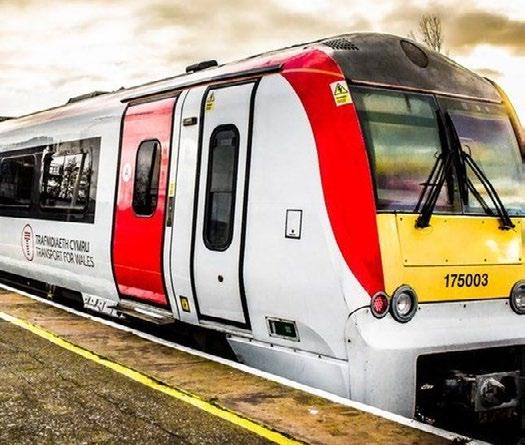
Transport Minister, Richard Holden said:
Delivering better transport links is a vital part of how we transform opportunities for people from across the United Kingdom.
That’s why I am so delighted that, working with the Welsh Government, we are getting the ball rolling on in-depth work to boost connectivity and drive growth.
Following the publication of Lord Peter Hendy’s Union Connectivity Review in 2021, the UK government committed to forging and strengthening transport links that will create a more cohesive and connected United Kingdom.
Research carried out for the report specifically high-


David TC Davies said:

Good transport connections between south Wales and western England are essential for the economy in Wales, enabling businesses to grow and flourish and making life easier for people to travel for work and leisure. This funding from the UK government is vital in exploring how best to relieve congestion across south Wales.
I’m pleased to work with the Welsh Government on plans that could have a huge impact on the many thousands of people who use the transport network in south Wales every day.
lighted how important travel across the border between Wales and England is, with a large number of people travelling daily for work, services and leisure.
Lee Waters MS, Deputy Minister for Climate Change: This is a key step to tackle congestion around Newport and was one of the main recommendations of the Burns Commission, which was endorsed by Lord Peter Hendy’s Union Connectivity Review. The business case is compelling and we
are keen to make progress so that we can get more people onto South Wales Main Line trains, complementing Welsh Government’s investments in improving access to rail.
Lord Peter Hendy also proposed reviewing the route connecting north Wales to the north-west of England, better connectivity with HS2 and a package of railway improvements to increase connectivity and reduce journey times between Cardiff, Birmingham and beyond.
The government’s Start Up Loans scheme has achieved another landmark milestone as the 100,000th business loan is granted, bringing the total support given to firms to more than £941 million, it has been announced in early February).
The scheme, administered by the British Business Bank, offers financial support, guidance, and advice to entrepreneurs looking to start their own business.

Business Minister Kevin Hollinrake visited the 100,000th recipient, a thriving St Albans based noodle shop Ramen Electra, run by James Fraser, to hear about how crucial the firm’s Start Up Loan was in getting the successful business off the ground and to mark the important milestone.
Business Minister, Kevin Hollinrake said:
The Bank of England Monetary Policy Committee announced on 2 February 2023 to increase the Bank of England base rate to 4% from 3.5%.

HMRC interest rates are linked to the Bank of England base rate.
As a consequence of the change in the base rate, HMRC interest rates for late payment and repayment will increase. These changes will come into effect on:
13 February 2023 for quarterly instalment payments
21 February 2023 for non-quarterly instalments payments
Information on the interest rates for payments will be updated shortly. How HMRC interest rates are set HMRC interest rates are set in legislation and are linked to the Bank of England base rate.
Late payment interest is set at base rate plus 2.5%. Repayment interest is set at base rate minus 1%, with a lower limit - or ‘minimum floor’ - of 0.5%.
The differential between late payment interest and repayment interest is in line with the policy of other tax authorities worldwide and compares favourably with commercial practice for interest charged on loans or overdrafts and interest paid on deposits.
The rate of late payment interest encourages prompt payment and ensures fairness for those who pay their tax on time, while the rate of repayment interest fairly compensates taxpayers for loss of use of their money when they overpay.
We know how important small businesses are to our communities, creating jobs, growth, and opportunities, and that is why we are backing them all the way to not only start up, but to scale up.
As a former business owner, I know how difficult it can be to get your business off the ground, which is why I’m incredibly proud that Government-backed Start Up Loans have helped 100,000 aspiring entrepreneurs, from Shetland to Shoreditch, to make their dreams a reality.
Of the total of more than 100,000 loans, 40 percent have gone to women and one-in-five to people from Black, Asian, and other ethnic minority backgrounds.
Meanwhile, young people (aged between 18-24 years old) have received 14 percent of loans since the scheme was established in 2012.
The success of the Start Up Loans scheme has been felt nationwide, with new and exciting businesses across the country using them to establish and grow.
The top five local authorities by loan volume and value are Birmingham, Leeds, Cornwall, Hackney in East London and Manchester, demonstrating the impact of Start Up Loans across the UK.
With 12,382 loans in the North-West, 7,117 in the East of England, 5,616 in the East Midlands and 15,39 in Northern Ireland, as well as many more across all parts of the United Kingdom, the Start Up Loans scheme has seen the entire UK benefit, with total economic activity estimated to be around £5.3 billion.
The government is not only supporting businesses to start up, but to scale up too. The Start Up Loans scheme was recently expanded to provide finance to eligible businesses operating for up to 5 years to support their expansion. The Business Secretary Grant Shapps also recently announced a ‘Scale-up Summit’ to bring together key technology, development and finance figures who have accelerated businesses from start-ups to scale-ups.
The Start Up Loans programme provides personal loans of up to £25,000 to aspiring businesses while also providing dedicated mentoring and support to each recipient. The goal of the scheme is to make sure that viable start-ups and earlystage businesses have the finance and support they need to thrive.
Funding for the programme comes from the Department of Business, Energy and Industrial Strategy and is administered by the British Business Bank.
Richard Bearman, Managing Director, Start Up Loans said:
Start Up Loans supports people across the UK who are looking to start their own businesses and passing our one hundred thousand loan milestone is an amazing achievement that has been ten years in the making. We could not have achieved this without the dedicated support of our network of UK delivery partners and in-house team, and I’d like to take this chance to thank them for everything they do to make our work possible.




A survival-thriller about a displaced indigenous man, stars Manoj Bajpayee, Mohammed Zeeshan Ayyub, Smita Tambe and Megha Mathur. It also features Tannishtha Chatterjee and Rajshri Deshpande in special appearances. The premiere was attended by the cast and crew including director/ producer Devashish Makhija actors Manoj Bajpayee, Mohammed Zeeshan Ayyub, Smita Tambe, producers Shariq Patel, Ashima Awasthi, Bhumika Tewari, and Anupama Bose.
IFFR returns with this edition to play as a bigger, robust on ground festival after 2 online editions in 2021 & 2022 because of the pandemic.
Joram is Devashish’s third collaboration with Manoj Bajpayee, and his third film to be screened at IFFR after Ajji and Bhonsle. The film was also part of FBR section of the Viewing Room at NFDC’s Film Bazaar, 2022.
Joram director & partner, Makhijafilm, Devashish Makhija says, “It is a privilege for a film to have its

first ever public screening before an audience as engaged, enthusiastic and emotional as the one at IFFR. With a take-off as energising as this, we are hopeful ‘Joram’ has found wings that will help her soar.”
Shariq Patel, the CBO, of Zee Studios says, “Thrill and drama power packed with great screenplay make the artillery for Joram. We are elated over the selection at IFFR. We are dedicated towards backing content-driven films that leave an international mark.”
Actor Manoj Bajpayee says, “I am touched with the overwhelming response we received for ‘Joram’ at the International Film Festival Rotterdam. I am pleased to know that the riveting survival story of ‘Joram’ and its intricate characters struck a chord with those who watched it. It was an honour to have been a part of the grand event in Rotterdam. I was fortunate to meet other critically acclaimed filmmakers whose films I would be interested to experience. On behalf of director Devash-
ish Makhija, Zee Studios and all those involved in making ‘Joram’ I express my gratitude to all those who supported and shortlisted our film for viewing at your prestigious festival.”
Actor Mohammed Zeeshan Ayyub says, “It is an absolute honour to witness ‘Joram’ being received so wonderfully by an equally perceptive global audience at the Rotterdam festival. This project is a dream come true in terms of the story and talent involved. So it’s assuring that stories told with honesty have an audience across the globe”.
Producer & Makhijafilm’s Managing Partner Anupama Bose says, “It’s exhilarating as well as humbling to have my debut feature as a Producer premiere & be appreciated at the prestigious IFFR. Gratitude to the Universe! Fingers crossed for the journey ahead... for Devashish & all of us at Team Joram.”
Presented by Zee Studios and produced by Zee Studios in association with Makhijafilm, Joram is all set to be released this year.
OF ZEE STUDIOS
JORAM STARRING MANOJ BAJPAYEE AND MOHAMMED ZEESHAN AYYUB, GOT AN OVERWHELMING RESPONSE AT THE 52ND INTERNATIONAL FILM FESTIVAL ROTTERDAM (IFFR)
After shattering records with massive critical acclaim back in 2001, Zee Studios is back with the most anticipated sequel of ‘Gadar 2,’ that redefined patriotism, love and passion in Bollywood

Apart from having an incredible line up of titles for 2023, Zee Studios is all set to continue their realm of creating path-breaking cinema with the first poster release of Bollywood’s mostawaited sequel, Gadar 2, in association with Anil Sharma.

The Sunny Deol, Ameesha Patel and Utkarsh Sharma starrer created an insurmountable stir in Bollywood ever since its inception. Fans, critics, noted names from the industry expressed their excitement over the most celebrated sequel of Bollywood. To add a cherry on the top, the makers, Zee Studios and Anil Sharma have decided to gift the first look of Gadar 2 featuring Sunny Deol to the people of India!
Sharing his joy over the first poster launch, director and producer Anil Sharma added, “Gadar - Ek Prem Katha isn’t my film but it’s people’s film and dynamically shifted the paradigm of the Indian film industry. It went on to become a cult icon wherein people breathed Tara Singh and Sakina’s love story. We are absolutely thrilled to launch the first poster!”
Speaking about the film CEO of Zee Studios Shariq Patel said, “The original team of ‘Gadar - Ek Prem Katha’ is back after 22 years and we are elated to be associated with the team on this one. The first installment gave some iconic scenes, songs and character to the Indian Film Industry and is popular even today. Needless to say, entertainment and emotion make up the artillery for ‘Gadar 2’ and we are delighted to commemorate the Republic Day with the first poster launch.”
Adding to it, Superstar Sunny Deol stated, “‘Gadar - Ek Prem Katha’ has been an eminent part of my life, personally as well as professionally. Tara Singh from Gadar isn’t just a protagonist but went on to become a cult icon that defied all odds and crossed all boundaries for his Family and Love. Collaborating with the team after , 22 years was a creatively enriching experience.”
The first movie Gadar - Ek Prem Katha is still celebrated amongst the Indian audiences. The movie created a new wave of nationalism in the country and the storyline still rules millions of hearts! Helmed by Director-Producer Anil Sharma, and produced by Zee Studios, the movie stars Sunny Deol, Ameesha Patel and Utkarsh Sharma in lead roles. The movie is scheduled to be release on 11th August 2023.
In 2021 Identical British South Asian Twins Amar and Arjun Purewal made history lining up against each other at Wembley Stadium in FA Vase final; Amar leading the line for Hebburn Town with Arjun as captain. Making them first pair of identical twins to play in a major final at Wembley, as well as being the first Asian players.
The House of Khalsa exclusively announce The Purewal Twins as the face of House of Khalsa as ambassadors.
The Purewal Twins are one of its most popular and highprofile faces for House of Khalsa brand, With its sleek and elegant design, House of Khalsa makes a luxury watches, which are the perfect match for the Purewal Twin’s. Each of house of Khalsa watches are manufactured in Switzerland and Hong Kong and engraved with the Khalsa symbol.

Danny Singh CEO The House of Khalsa commented’ We are proud to announce our partnership



with both Arjun and Amar Purewal, they are amazing role models for our commu-
nity and a perfect fit for our brand. They fit beautifully into our company mission

statement; we very much look forward to working with them on a larger platform’


Amar and Arjun went onto comment’ We are proud to representing House of Khalsa and engaging in a brand that takes our culture forward and in return lets us promote football in our community, we are very much looking forward to our journey with The House of Khalsa.
On the work front Arjun and Amar are successfully working on AP Coaching, which is going from strength to strength, with Arjun working towards his UEF B Licence.
PERIENCE HOUSE OF KHALSA AT SUNNY
JEWELLERS LEICESTER
Sunny Jewellers is the official stockist for House of Khalsa watches in Leicester. To experience House of Khalsa head towards The Golden Mile for Your timepieces known for their intricate craftsmanship.
The Kartik Aaryan and Kriti Sanon starrer Shehzada has a new release date and will now release on 17th February 2023. The film, directed by Rohit Dhawan and produced by Bhushan Kumar, Allu Arvind, Aman Gill and Kartik Aaryan, was earlier scheduled to arrive in theatres on 10th February 2023.

The producers decided to push the film’s release “out of respect for
Pathaan”, which has been doing well at the box office.
Shehzada is directed by Rohit Dhawan, starring Kartik Aaryan, Kriti Sanon, Manisha Koirala, Paresh Rawal, Ronit Roy, Sachin Khedekar, music by Pritam, produced by Bhushan Kumar, Krishan Kumar, S Radha Krishna, Allu Aravind, Aman Gill and Kartik Aaryan, the film is set to release on 17th February 2023.

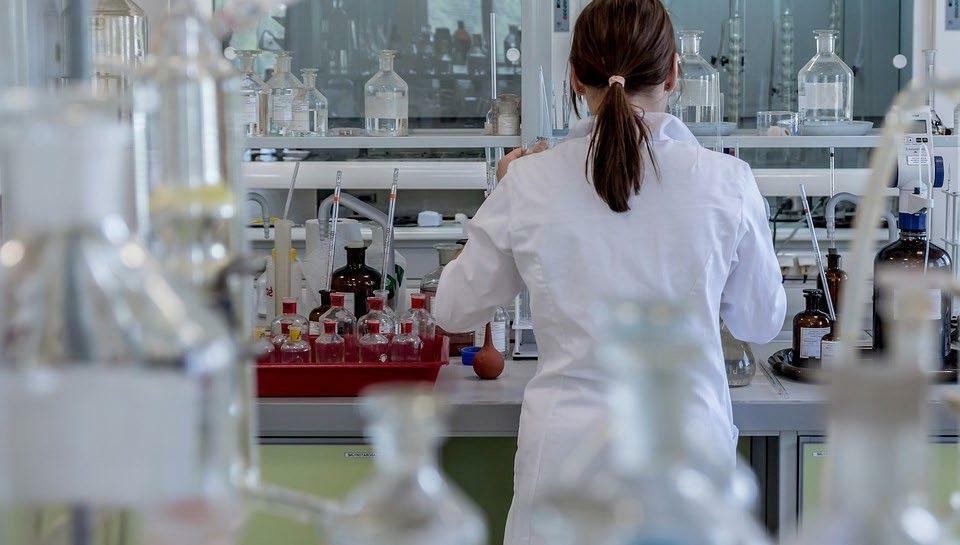
Patients across the UK are set to benefit from access to safe, effective and innovative equipment and medical devices as part of the first ever medical technology (medtech) strategy published today.
The blueprint for boosting NHS medtech will focus on accelerating access to innovative technologies, such as the latest generation of home dialysis machines that enable patients to manage their own health at home and in their day to day lives.
It also sets out steps which need to be taken to ensure patients can access safe, effective and innovative technology through the NHS, which can help diagnose, treat and deliver care more quickly, freeing up clinician time. The NHS spends £10 billion a year on medtech including syringes, wheelchairs, cardiac pacemakers and medical imaging equipment such as X-ray machines.
Building on learnings from the COVID-19 pandemic and the rapid development of medical technologies during that time such as lateral flow tests and ventilators, this strategy will ensure the right product is available at the right price and in the right place. As a result, patients will continue to have access to high-quality care, alongside improved patient safety and health outcomes.
The strategy aims to deliver value for money, using the latest data on the effectiveness of new technology to ensure prices are reasonable for the health system. It will also help build resilient supply chains and ensure the UK is prepared for
future pandemics, just as demand for technology like syringes and ventilators rapidly increase during the pandemic.
Using medtech effectively will be critical in reducing waiting lists for treatment caused by the pandemic as it has the potential to speed up diagnosis and deliver new and improved ways to treat and support patients. For example, COVID-19 demonstrated the importance of fast and accurate diagnostic testing and genome sequencing to process and share results, and home lateral flow testing showed the potential for increased use of diagnostics outside of formal clinical settings, to support earlier diagnosis and free up staff time.
Minister of State for Health
Will Quince said:
The UK’s innovative spirit delivered revolutionary technology during the pandemic - from COVID tests and ventilators - and we want to harness this in promoting cutting-edge medical advancements to improve patient care.
The NHS spends around £10 billion a year on medical technology and I’m looking forward to working with industry to use this as we focus on reducing hospital stays, enhancing diagnosis, preventing illness and freeing up staff time.

This new medtech strategy will help build a sustainable NHS with patients at the centre so people can continue to access the right care at the right time.
The key aims of the strategy are to:
boost the supply of the best equipment to deliver greater re-

silience to health care challenges, such as pandemics, and enhance NHS performance through modernised technology which will enable faster diagnosis, treatment and ultimately discharge to free up hospital beds encourage ambitious, innovative research to secure the UK’s position as a global science superpower and attract vital investment for the UK economy and create jobs across the country. In 2021, there were already around 60 different research programmes supporting innovative technologies, representing over £1 billion of funding increase understanding and awareness of medtech by clinicians which will lead to more informed purchasing on new products and deliver better value for taxpayer money and better services for patients build on the Life Sciences Vision to improve collaboration between the NHS, the National Institute for Health and Care Excellence (NICE) and the Medicines and Healthcare products Regulatory Agency (MHRA) as an innovation partner to ensure patients can access the right products safely The implementation plan to deliver on this strategy will be published later this year and will include a review of the £1 billion spent on appliances in primary care, new comparison tools to enable better decision making when purchasing which achieve the best results for patients, and collaboration with industry to ensure availability of key products to keep patients safe.


Anyone experiencing a mental health emergency will benefit from more tailored emergency care and support in the community through specialised mental health ambulances, more crisis services and improved health-based places of safety.
A £150 million investment up to April 2025 will better support people experiencing – or at risk of experiencing – mental health crises to receive care and support in more appropriate settings outside of A&E, helping to ease pressures facing the NHS. Patients presenting with mental health problems are twice as likely to spend 12 hours or more in emergency departments than other patients. While some of these patients will be in A&E for urgent medical care, we know that often they would be better treated elsewhere.
The funding will allow for the procurement of up to 100 new mental health ambulances, which will take specialist staff directly to patients to deliver support on scene or transfer them to the most appropriate place for care.
It will also fund 150 new projects centred on supporting the provision of mental health crisis response and urgent mental health care. The new projects include over 30 schemes providing crisis cafes, crisis houses and other similar safe spaces, as well as over 20 new or improved health-based places of safety which provide a safe space for people detained by the police.
Prime Minister, Rishi Sunak said:

People in mental health crisis deserve compassionate care in a safe and appropriate setting. Too often, they end up in A&E when they should be receiving specialist treatment elsewhere. This important funding will make sure they get the help they need, while easing pressures on emergency departments and freeing up staff time – which is a huge priority for the government this winter.
Improvements to NHS 111 and crisis phone lines will also be rolled out.
In the middle of a challeng ing winter, the government is doing everything it can to ease the pressure on the NHS, particularly A&E, by making sure people are receiving the care they need in the most ap
propriate setting.
These schemes – along with the up to 100 new mental health ambulances – will give patients across the country greater access to high-quality, tailored support when needed the most.
The new ambulances have been designed to provide a calmer environment, avoiding the bright yellow interior of traditional NHS ambulances and using simple NHS service logos, dimmable lighting and space for family and friends to accompany the patient during assessment. These are backed by £7 million in government funding.
The remaining £143 million of capital funding, announced in the 2021 Spending Review, will go towards the 150 new projects. It will be invested in providing and improving
Barclay said:
With the health systems facing huge challenges this winter from the rise in flu, ongoing COVID-19 cases and the impact of the pandemic, we need to ensure people are still receiving the right specialist care. These dedicated facilities will ensure patients experiencing a mental health crisis receive the care they need in an appropriate way, while freeing up staff availability including within A&E departments.
and care centres and the redesign and refurbishment of existing mental health suites and facilities including in emergency departments, creating spaces outside of A&E, and the expansion of crisis lines.
With planned projects located across the country, the 150 schemes support the wider government commitment to level up mental health and wellbeing across the country – including some of the most deprived local authority areas in England.


Programmes will also focus on preventative measures, including improvement of sanctuary spaces, to improve mental wellbeing, and community mental health facilities that will work to help people before reaching crisis point. This builds on our existing plans to improve mental health services. We are investing at least £2.3 billion of additional funding a year by April 2024 to expand and transform mental health services in England so that 2 million more people will be able to get the mental health support they need.
Every area now has in place 24/7 NHS open access urgent mental health helplines. The helplines are currently taking around 200,000 calls per month, with only 1 to 2% reported as being directed to 999 or A&E. In the community, NHS mental health support teams are being rolled out in schools and colleges, offering early mental health help to children and young people. We are on target to reach 35% of pupils by the end of this year.
Chef Nicolas (Instagram A/c: nicolas_nikolakopoulos) passion for pastry and chocolate was from childhood. He didn’t have anyone in his family working in this similar role, being the only child in the family he loved to sneak into the kitchen and make whatever recipes he could find the ingredients from since the age of 8. Another passion of his was to study chemistry, he obtained his degree as a chemist from the Aristotle University of Thessaloniki. He worked as a chemist but he never stops thinking about his other passion i.e., cooking. So, he studied Pastry at Le Monde Culinary and Tourism College in Athens and left for Paris for further training and experience at Ecole Lenôtre in Paris. He worked in many hospitality outlets, hotels, and restaurants, and now he owns a consulting business NZ Dessert Designers along with his partner Chef Zissis Goudas. His business is responsible for designing dessert menus, recipes, and specialty products R&D for international customers like boutiques, hotels, pastry shop chains, and food industries, as also organizing pastry seminars and training. For the last 9 years, he also worked as a Pastry, Chocolate, and Food
science professor in the very school where he started Le Monde College. In March 2022, he won the title of “SE Europe Chocolate Master”, in the regional World Chocolate Masters Competition. In October he won third place at the finals of the World Chocolate Masters in Paris.

Q.) Please share your experience of the world chocolate master competition.
Chef Nicolas: The WCM competition is a life-changing experience. Coming from Greece, where the competition is mainly known to people in the industry, it was quite hard to prepare for. It was the first time a Greek candidate was a part of WCM. My resources were limited, and consequently, I had to do many things by myself that I didn’t imagine before, things that had little to do with actual chocolate, such as 3D, graphics and packaging design, packing, constructions, speech writing, website design, brand marketing, and so many other things. It was certainly very demanding, but I did learn a lot in the process. The competition part did come with its unpredicted challenges and last-

moment issues, but as the clock started, I was getting in the zone and nothing else mattered but following through with each assignment. In the end, apart from the wonderful result of being of the top 3 Chocolatiers in the world.
In retrospect, everything was worth it. I realized who my true supporters were, people who sacrificed a part of their own life to be close and assist me every step of the way, my team was small and mainly inexperienced in chocolate, but they were very passionate and dedicated.
The first was my assistant and sous Chef Yiannis Asproulis, and also chef Dimitra Chatzimichail. Many of my pastry students helped with the preparations too, and selected Greek companies also assisted me by sponsoring their products.
Q.) Why did you choose chocolate as an ingredient to make your career as a dessert chef?

Chef Nicolas: I don’t remember ever making that choice consciously, I think chocolate chose me!
It has always been like a muse for me, and a product that I admire in every way. It is proof of a perfect synergy between nature, tradition, art, and human knowledge, and it is also a superfood. It’s my number one choice when I want to express my artistic side.
It’s no less than mystifying to me. Coming from cacao, also known as the “Food of the Gods” it is a product with thousands of years of history that, ever since it left Meso-America, it took over the world. It took deep roots in our culture, our food habits, our psychology, and now in our nutrition. It is a delight that can make you dream when you bite into it. The world stops for a few seconds and you are just indulging, enjoying.
Q.) How is your chocolate dessert different from others?
Chef Nicolas: Being a chemist, I always take a more holistic approach when it comes to my desserts. My goal is to create desserts that are functional, nutritious, and tasty at the same time. I try to use innovative techniques, and a very big part of my creation process is STORYTELLING. I always try to have a story, an image, or an inspiration behind every creation. Desserts are my way to pass a story to the consumer. That is what makes my desserts different from my point of view.
Q.) From where do you find your inspiration for your chocolate dessert?
Chef Nicolas: From everywhere really. I am quite visual, so things that I see in everyday life can be a part of my crea-
tive process. But a big part of this process is stories and emotions. When I design a dessert, I don’t just want to create a tasty delight, I design an experience. A dessert that when consumed, will invoke feelings from the moment you see it till the moment you take your last bite. So, my inspiration might come from a trip to the countryside, a view of the sea, a fairy-tale story that I hear, a childhood memory, or even a conversation with a friend.
Q.) Is it easy to make dessert with chocolate?
Chef Nicolas: As with watercolour painting, there are easy things to paint, and there are wall-sized masterpieces. No matter what you make though, you still get to enjoy the process. With chocolate there are ten-minute recipes you can make, that will make someone very happy. Some things need long days of preparation and require knowledge and experience. So, there is something for everyone to enjoy making, no matter their level. For sure you have to respect the material, and then just have fun with it.
Q.) How is the idea come to make a masterpiece from chocolate?
Chef Nicolas: As I said before, storytelling plays a very big role in my creation process. For the WCM competition, for example, the story that I wanted to present is “Chocolate makes us dream”. It connects us with our childhood optimism, and through chocolate, we can dream up a better future. It connects both sides of our brain, the logical part with knowledge and technique, and the creative part of the brain with artistic expression and dreams. That’s for example what inspired me to create the #DESIGN assignment for the competition. called Chocolate Voyage.
Q.) Any advice for the upcoming chefs?
Chef Nicolas: My advice for the upcoming chefs is, to dream and not to give up on that dream. To set high goals and stay on the path to achieve them. While trying to get there, you arm yourself with experience, valuable partnerships, and technical skills. It is rarely an easy thing to do, but with perseverance, passion, and love for what you do, there will be a success.

“ Chocolate has always been my passion and muse and being recognized as a Master Chocolatier on an international level is definitely worth the dedication ” NICOLAS NIKOLAKOPOULOS


Choosing seasonal fruit and vegetables can be tricky, but if you’re looking to add a touch of colour to your diet, what better place to start than with Mediterranean produce? And the I Love Fruit & Veg from Europe campaign is here to help with everything you need to know… whatever the time of year!
Globe artichoke: Globe artichokes are both low in fat and low in carbohydrate and provide a good level of protein compared with other vegetables which tend to have values of less than 2%. They are high in folic acid and a source of potassium. They also provide useful levels of Manganese, Niacin and Magnesium.
Globe Artichokes have been part of the gastronomic culture of the Campania Region in Italy for thousands of years and have both DOC and IGP status. The “Carciofo di Paestum” PGI artichoke, also known as “Tondo di Paestum”, from the name of the type from which it derives, is associated with the group of “Romanesco” type artichokes, known for the rounded appearance of its flower heads, their high compactness, and the absence of thorns in the bracts.
Racula / Salad rocket: Racula or salad rocket is a peppery tasting green originating in the Mediterranean region. Low in calories, carbohydrate, and fat, it is packed with the following vital vitamins and minerals for good health – high in both Vitamin K and Folic acid and providing a source of calcium, Vitamin C, Vitamin A, and potassium. Its dark green sprigs are a super-distinctive salad ingredient with an oh-so-peppery bite. In particular the Piana del Sele rocket with its unique flavour and distinct aroma, has received the prestigious European IGP
mark.
Savoy Cabbage: is a winter vegetable and one of several cabbage varieties. It has crinkled, emerald, green leaves and is named after the Savoy region in France. It is high in both Vitamin C and Folic acid and provides a source of fibre, Vitamin A, and potassium.
Basil: comes in many varieties, differing in size of the leaves to their fragrances echoing cinnamon or anise, even lemon. It adds colour and flavour to many dishes, particularly in Italian and Thai cuisine.
Basil contains the antioxidants lutein and beta carotene, these carotenoids can protect us from disease and enhance our immune system. Basil is also high in the antioxidant Vitamins A and C as well as being high in calcium and Iron and providing a source of potassium.
Parsley: often thought of as a garnish, parsley has so much goodness: both nutritional and in flavour, making it so much more than a decoration! There are two types of fresh parsley – curly leaf and flat leaf which has a stronger flavour.
Parsley has many vitamins, minerals and antioxidants that can provide important health benefits. It is a particularly rich source of Vitamin K which is required by
the body for blood clotting and helping wounds to heal. Parsley is also rich in Vitamins A and C, Folic acid and Iron and a source of calcium.
Round lettuce: delicate in taste, texture and colour, it is the perfect gentle leaf for summer and famous for giving salads a base. Health benefits vary depending on the type of lettuce and a typical round lettuce, surprisingly, is a rich source of Vitamin K and a good source of Folic acid. Prickly pear: ranging in colour from green, which isn’t very sweet, to red, which is the sweetest. Yellow and red prickly pears tend to contain the most vitamin A and carotenes and they are also a source of vitamin C. In terms of mineral make-up, they are a source of magnesium and provide potassium and calcium. This unique variety of pear has both DOP and IGP protected status. Red orange (Blood orange): have a dark red flesh and less acidic, yet slightly sweeter taste than regular oranges. They are full of anthocyanins, responsible for their dark red colour and these antioxidants help the body reduce damage from harmful free radicals. They are also rich in vitamin C. The Sicilian Arancia Rossa also has both DOP and IGP protected sta-
tus.
Peaches: There are two varieties of peach, grown in two different regions of Sicily that have both been recognized by the European Union with PGI status. The Leonforte peach is cultivated with centuries old tradition and is a late season peach with yellow flesh. The Bivona peach is a velvety peach with creamy white flesh and slightly red veins. It is sweet with an unmistakeable scent, making it unique. Peaches are high in Vitamin C and provide useful amounts of Potassium and Vitamin K.
Coscia pear: is an Italian variety of pear with creamy white flesh and a slightly scented, sugary flavour. They are low in calories, fat and provide us with fibre. They also contain useful levels of Potassium which helps regulate fluid balance, muscle contraction and nerve signals.
Watermelon: invigorating and refreshing, watermelon provides a natural source of hydration. Its cheery red colour comes from lycopene, an antioxidant in the carotenoid family. Antioxidants protect the body from damage caused by compounds known as free radicals.
Spring onion: high in levels of Vitamins C and K, both of which are essential for normal functioning of bones. Vitamin C helps in the synthesis of collagen that makes your bones strong, while vitamin K plays a key role in maintaining bone density. While some cuisines eat only the white part, and others eat only the green part, the whole wonderful length of the green onion is delicious in its own way: like having two vegetables in one!
Kohlrabi: a bulb-shaped vegetable with a crisp, crunchy texture is part of the cabbage family. Less common in UK
cuisine, it is high in both Folic acid and Vitamin C and contains a wide array of antioxidants such as anthocyanins, isothiocyanates and glucosinolates.
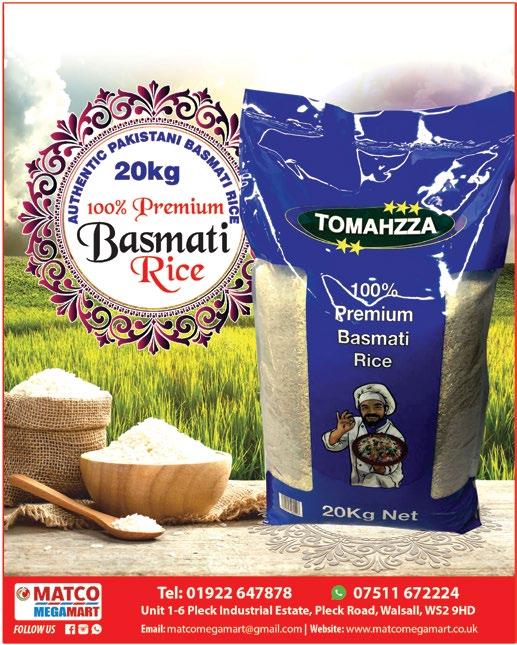
Radish: the perfect vegetable to slice and add to a wide variety of salads, sandwiches or soups. A root vegetable with variable skin colour and an almost spicy, peppery taste. They are a good source of antioxidants like Catechin, Pyrogallol, Vanillic acid and other phenolic compounds. They are also a good source of Vitamin C, which acts as an antioxidant to protect against cell damage.
Green and Red Lollo Salad: Lollo Rosso has more antioxidants than regular lettuce. It also contains Vitamins A and C and is a good source of both Folic acid and Potassium.
Asparagus: a spear-like vegetable and member of the lily family, it is one of several vegetables that act as a prebiotic, feeding the beneficial bacteria which live in our digestive systems, helping them thrive and increase in number. It is a rich source of Folic acid and a good source of Vitamin C as well as providing useful levels of Vitamin E.
Sweet chilli peppers: can be tasty, sweet, or super-hot too! These peppers contain the compound capsaicin, which gives them a distinctive taste as well as several health benefits. Their characteristic red colour is an indication that they are rich in beta-carotene or pro-Vitamin A. Vitamin A is key in maintaining healthy vision and a healthy respiratory, intestinal, and urinary system. Also, Vitamins A & C are vital in building up your immunity against infections and illnesses.
Volkswagen Commercial Vehicles has launched a new Augmented Reality experience, allowing customers to virtually explore life-size models of the ID. Buzz range, which saw its first UK customer deliveries in December. With the all-electric ID. Buzz range on sale and

available to test drive, Volkswagen’s new AR experience forms the latest addition to the manufacturer’s digital offering. Available across Volkswagen Passenger Cars’ retailer network, and over 60 UK Van Centres, the innovative new tool enables customers to explore a life-size
3D model of the ID. Buzz. Customers simply need to scan the QR code on their devices to access the virtual vehicles in all colourways. The tool can also be accessed here, allowing customers to see how the vehicle would fit into their everyday lives from the comfort of their own homes.
Kate Thompson, Head of Marketing, PR and Communications at Volkswagen Commercial Vehicles, said:
“The new Augmented Reality tool is a fun way to get a closer look at the iconic ID. Buzz. It additionally enables prospective customers to see the vehicle sat in their parking space at home, bringing their vision to life.
“Those visiting our Van Centres and Passenger Cars’ retailer network have a choice to browse our comprehensive range of products, both in reality and virtually, and speak to our team of experts about other services.”

Incorporating past, present and future, Volkswagen’s first purpose-built electric van harks back to the manufacturer’s iconic camper,
while striking a balance with its fully digital operation. With over 30 intelligent assistance systems available on board, excellent infotainment features and flexible connectivity, the ID. Buzz combines futuristic design and technology with comfort and safety, making it the perfect companion for the digital world.

Birmingham City Council is currently in the process of decommissioning and refurbishing several thousand devices for use in communities. The initial pilot scheme for the Birmingham Device Bank saw over 600 distributed to 85 charities across Birmingham.

Councillor Jayne Francis, Cabinet Member for Digital, Culture, Heritage and Tourism said: “This is a fantastic opportunity for charities and community groups who are helping local people without digital access. With too many families already struggling to heat their homes and put food
on the table, digital access can be completely out of reach even though it is so important.
“With this support, these organisations can help citizens build digital skills and confidence and assist them in applying for jobs and benefits they are entitled to.
“I’d encourage any organisations that think they may qualify to find out more. It will really support the great work they are already doing.”
In addition to the Device Bank the council has been helping people in need, working with partner organisations. The council ran a ‘Summer of
Skills’ programme last year over 11 dates in 7 key libraries across the city. 22 volunteers from 3 organisations (Barclays, Experian, and AbilityNet) supported 128 citizens with digital skills queries, and distributed 75 laptops directly to individuals in need, alongside 28 sim cards from The Good Things Foundation’s National Databank, supported by Vodafone and Virgin Media O2. The importance of digital inclusion is recognised within the council’s Digital City Roadmap which sets out a number of major programmes and projects to create a Digital Birmingham.
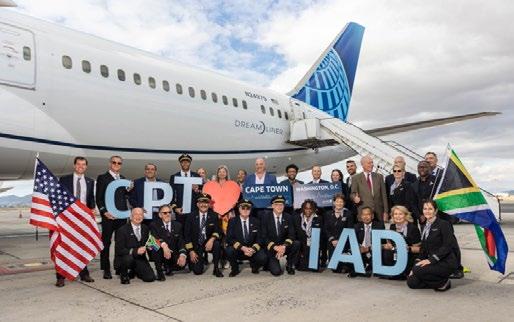



On the celebration of 60th anniversary of Washington Dulles International Airport, United Airlines launched their new flight service to Cape Town. To expand its services, they provided with a nonstop flights per week, year-round trip from Washington DC to Cape Town. This new route opened the path of success and opportunities for travel and trade.
The first inaugural flight
UA2222 on B787-9 Dreamliner was operated on 17th Nov departed from Washington Dulles Airport at 00:19 to Cape Town International Airport at 13:50. The first passengers including the airline’s Vice President were greeted by the local officials, members of the Western Cape government & the city of Cape Town, local talented Cape Minstrels band, Wesgro’s Cape Town Air Access
team. The passengers were sent off on a return flight UA2223 next day from Cape Town to Washington.
Ms. Nomasonto Ndlovu Chief Operating Officer at South African Tourism said, “The United States is a key source market for South Africa. We know that visitors from this market want to come experience our history and culture, our wildlife and safari and of course our beautiful wide-open spaces. South Africa is ready to deliver all of this and much more. As a country we thank our partners United Airlines for their continued support and welcome this direct flight. We invite
American travelers to visit Cape Town and then also explore other parts of South Africa as we have a lot to offer across our nine provinces.”
If we talk about past, United States has been Cape Town’s third largest international market and with this new route of two-way passenger volumes. There will be a vast increase in the recovery rate compared to 2019. It is estimated that this new direct service will result in a passenger stimulus of at least 25% for Cape Town. If we go through the comparing rates of air cargo then about 686 metric tonnes was transported in the first quarter of this year
between Cape Town and US. 74% recovery rate was seen as compared to the same period in 2019. In year 2021 approximately 2,384 metric tonnes of cargo were transported on the same route and an estimated 50% recovery rate compared to 2019.
Western Cape Minister of Finance and Economic Opportunities Mireille Wenger said, “Tourism is a major contributor to the Western Cape, supporting almost 175,000 jobs and generating roughly R15.5 billion in gross value added to the economy in 2019. We are excited to welcome United Airlines direct flights from New York. Not only do these flights boost tourism but they also provide great opportunities to export proudly Western Cape goods via air cargo.”
To boost the investment an estimated 191 international flights will come into Cape Town each week from January next year. We are now moving from recovery to growth in this sector.”
Nearly half of parents (46%) admit that their fondest childhood memories included school trips. A study of 1,600 parents of school aged children, commissioned by leading car manufacturer, Hyundai, has revealed that 44% feel nostalgic about their formative years and trips outside the classroom. Over a third (32%) also admit that school trips had such an impact that they shaped their future career path. Two thirds (65%) of those surveyed confess that they wish they had appreciated school trips and their benefits more when they were at school, with just under three quarters (72%) revealing that they want their children to have the opportunity to go on more school trips. Nearly two fifths (39%) also recognise there is a chance their youngster won’t be offered the opportunity to go on school trips during the 2022 to 2023 academic year due to lack of school funding and volunteers.

Škoda UK has been awarded a place on the government’s new Framework agreement, following a successful tender with the Crown Commercial Service (CCS). The CCS is the largest public sector procurement organisation in the UK and procures £22.7 billion of goods and services every year. Škoda has secured a place on the new vehicle purchase framework, which is available for use by public sector bodies in key sectors such as central government, health and local government as well as the UK emergency services. Škoda has a proud tradition of supporting the emergency services that dates back more than 117 years. From
the groundbreaking Voiturette Ambulance of 1906 to today’s high quality fleet of Police, Ambulance, and Fire and Rescue services models, Škoda has long been the brand of choice for emergency services across Europe.
Škoda UK’s emergency services sales have increased 40% since 2018. The brand expects to deliver around 6,000 + cars to government bodies under the new agreement thanks to its reliability, value and aftersales service.

Nick O’Neill, Škoda Head of Direct Sales, said: “There is a focus for frontline public services to drive efficiencies for both time and cost. We have worked

effectively with government bodies over the past decade to ensure that we meet their requirements and provide a reliable service. I look forward to continuing this partnership over the next four years.” Bespoke conversions for emergency service fleets can be provided through Škoda’s ‘one-stop’ shop package. Alongside hassle-free finance solutions, Škoda fleet can provide the vehicles fully converted to suit specific requirements, and fleet managers have the peace of mind that the conversion, breakdown recovery, service, maintenance and repair requirements are built into one package.

This research has been commissioned by Hyundai to launch its ‘Great British School Trip’ programme. The ambitious initiative will provide 25,000 school children aged seven to 14 with free school trips in 2023. The automotive company will offer bursaries to help the schools most in need to fund their school trips, including booking fees and travel costs.

Ashley Andrew, Managing Director, Hyundai Motor UK, said: “When you’re a child, it’s great to get out and about to bring your learning to life, so it’s no wonder it’s such a key memory for so many.


“Getting out of the classroom not only creates memories but fundamentally also brings a sense of excitement to a particular school subject. Also, school trips are often the first opportunity for a child to gain a sense of independence so it’s no surprise that many people remember the small things like reserving the back of the bus and spending time with friends in a new environment.
“We firmly believe that school trips are an essential part of our young people’s development and something that every child should have access to, creating
the same memories as their parents.” Through the ambitious initiative, Hyundai is investing £1 million in the programme, which has been shaped around Hyundai’s vision for the future, Progress for Humanity. This vision focuses on how connections and collaboration can help accelerate progress and innovation. The programme will be centred around four themes: Imagination and Curiosity, People and the Planet, Journeys and Adventures and Breakthroughs and Discoveries. The research drew attention to the benefits of school outings, with the opportunity to visit places outside of the classroom cited as the main advantage, as well as being able to link topics and subjects in a more meaningful way and allowing children to contextualise their classroom learnings. Over 350 venues have shown their support for The Great British School Trip by signing up as trip locations already. Children will be able to explore locations including Peak Activity Centres, The YHA, Disney Theatrical and The V&A, amongst others.
UK car production declined -9.8% in 2022 to 775,014 units, according to the latest figures issued today by the Society of Motor Manufacturers and Traders (SMMT). December rounded off a volatile year, with output down -17.9% in the month after growth in October and November, with most of the year’s volume loss occurring in the first half. The annual total was 84,561 units down on 2021 and -40.5% off the 1,303,135 cars made in 2019 pre-pandemic, equivalent to a loss of more than half a million cars.1 The main reasons for the depressed output were the crippling global shortage of semiconductors, which limited the ability to build cars in line with demand; significant structural changes, reflecting a loss of production at two volume manufacturing sites; and the impact of supply chain pauses in China due to Covid lockdowns.
Despite these challenges, UK factories turned out a record 234,066 battery electric (BEV), plug-in hybrid (PHEV) and hybrid (HEV) electric vehicles, with combined volumes up 4.5% year-on-year to represent almost a third (30.2%) of all car production. Total BEV production rose 4.8%, with hybrid volumes up 4.3%, and boosting output of these vehicles will be critical in the attainment of net zero, for both the UK and major overseas markets.
The figures come as fresh SMMT analysis confirms the increasingly important role of electrified vehicle production to the UK economy, especially the value of exports.
Since 2017, the value of BEV, PHEV and HEV exports has risen seven-fold, from £1.3 billion to more than £10 billion. As a result, electrified vehicles represent 44.7% of the value of all UK car exports, up from a mere 4.1%. BEVs, in
particular, are critical to the future prosperity of the UK, with their export value up more than 1,500%, from £81.7 million to £1.3 billion.2 The UK’s strength in specialist, luxury and performance car makers was also further underlined, with output climbing 6.6% to 32,575 units, worth an estimated total of £3.7 billion at factory gate prices, driven by a number of new launches and models in high demand from buyers around the world. These manufacturers play an important role in the development of advanced automotive
technologies such as light-weighting and electrification which, in turn, can help advance wider industry.
Total annual output for the UK market grew 9.4%, but this was not enough to offset a -14.0% drop in exports. Nearly eight in 10 cars (606,838 units) were built for overseas markets, compared with 168,176 for British buyers, emphasising the importance of free and fair global trade.

The EU remained by far the sector’s largest market, even as shipments declined -10.0%, with 57.6% of exports (349,424 units) heading into
the bloc. While exports to the US and China also fell, down -31.6% and -8.3% respectively, the number of cars sent to Japan (+5.7%), South Korea (+32.8%), Australia (+4.7%), Switzerland (+2.7%) and South Africa (+23.0%) all increased, although together these represented just 8.4% of exports. Exports to Russia, a top 10 export market in 2021, meanwhile, fell -78.3%, with shipments made before the outbreak of war in Ukraine and the cessation of business.
A survey commissioned by Apollo Tyres has found that only 6% of motorists in the UK are able to correctly identify a tyre’s ‘load rating’, which signifies the maximum weight of the vehicle that can safely use the tyre. Choosing a tyre with an unsuitable load rating can compromise the vehicle’s performance and efficiency, as well as its safety. Modern electric vehicles (EVs) are typically much heavier than conventional combustion engine alternatives, making it even more important for consumers to select a compatible tyre. The Apollo Tyres survey, which polled 1,000 motorists across the UK, found

that 11% of men were able to identify the load rating mark on a tyre, compared to just 3% of women. The survey also found that just 14% of motorists are aware that tyres fitted to an EV normally need to be inflated to higher pressures, to ensure safe and efficient operation. That proportion falls to only 6% among motorists aged 55 to 64, and peaks at over half (52%) among 18- to 24-year-olds. Crucially, among EV drivers, the percentage is still low – just 38%. Tyre inflation rates are specific to each vehicle and are essential for maintaining optimal levels of grip, traction and rolling resistance.
Yves Pouliquen, Head of Sales and Marketing at Apollo Tyres, comments: “As Europe moves towards the mass adoption of EVs, it is becoming even more important for carmakers and the wider tyre industry – from manufacturers to retailers and fitters – to help consumers understand the crucial importance of load rating compatibility and the need to maintain correct inflation rates.
“The need to educate extends beyond the point of purchase. EV owners understandably want to maximise driving range, but under-inflation can significantly increase rolling resistance and that equates to poor efficiency.”
Drivers are spending more than three hours per year* clearing their windscreen of ice before driving in winter, according to research from Škoda UK. More than half (51%) of UK motorists are unaware that they could face fines of up to £80 for leaving their engine idling when defrosting their windscreen in cold weather on a public road.** Defrosting a car’s windscreen is a common chore in winter, with Škoda research finding that a third (35%) of motorists spend between five and seven minutes on average doing it, while a further tenth of drivers (13%) spend a total of eight to 10 minutes. A quarter (25%) of drivers spend at least two to four minutes clearing their screen when it is iced over. Applied to the UK’s car park of 40.8 million licensed vehicles, the nation wastes the equivalent of 337 years defrosting their windscreen.* When asked what methods they commonly use to combat the frost, the most popular answer was using the car’s heating system (63%), followed by an ice scraper (57%), deicer (44%), windscreen wipers (27%), boiled water (15%), while more than one in ten (13%) admitted to using their bank card or plastic card. The same research found more than three quarters (76%) turn their engine on and keep it running while defrosting their car to ‘aid’ the process.
Despite the majority of motorists leaving their engine on, 51% were unaware that leaving their engine idling while defrosting their windscreen on a public road could lead to a fine of up to £80. Nearly three quarters (74%) of UK drivers are also unaware that electric vehicles (EVs) can be ‘preconditioned’ via an app to defrost the screen before they even get into their car on a frosty morning. Using the Škoda Connect app or by setting the parameters on the infotainment system, the Škoda Enyaq iV can be preconditioned to defrost the windscreen, heat the cabin, and prepare the battery in cold conditions so that it is ready to drive for a scheduled time. Drivers who keep the charging cable connected when preconditioning the car, avoid drawing energy from the battery and ensure the maximum possible driving range when they set off. Drivers could save up to 10 minutes a day by using the preconditioning feature of Škoda’s electric cars. More than two thirds (67%) of drivers would be likely to use preconditioning to save time, fuel, and standing in the cold by remotely defrosting their windscreen in advance if they had an EV. To increase heating efficiency and comfort during winter, the Enyaq iV also features a heated steering wheel, heated front seats, heated front washer nozzles, and tri-zone climate control.
UK DRIVERS LOSING MORE THAN THREE HOURS A YEAR DEFROSTING THEIR WINDSCREEN
SURVEY FINDS JUST 6% OF MOTORISTS ARE ABLE TO IDENTIFY A TYRE’S CRUCIAL ‘LOAD RATING

As part of the agreement, Sky will sponsor the 2023 Black In Sport Summit, to be held at the iconic London Stadium in Stratford – home of West Ham United Football Club and the host venue for the London 2012 Olympic and Paralympic Games. Now in its second year, the 2023 event will be hosted by Sky Sports News presenter Mike Wedderburn alongside freelance sports presenter Anita Abayomi. Taking place on Saturday 25 March 2023, it will feature a high-profile line up of keynote speakers, panel discussions, and networking opportunities with current and future professionals in from the sports industry. Sky Sports will also offer work placements to Summit attendees participating in the BISS ‘Employer Challenge’ initiative.
Co-Founders Ladi Ogunmekan, Samuel Ola, and Emmanuel Shittu launched BISS in 2022, in partnership with the University and Loughborough Sport, to celebrate the achievements of black people across the sports industry. The movement was also borne out of a desire to change the narrative in sport and to tackle discrimination and underrepresentation of black people in the sector. With the themes for 2023 – “Excellence, Leverage, and Influence”, BISS continues to build a community of current and aspiring profes-

Mike Wedderburn, Sky Sports News presenter, added:

“I am honoured to co-host the Black in Sport Summit 2023 in association with Sky. I was approached in 2021 to get involved in the first summit and I jumped at the chance to play my part in making a difference to young black people wanting to break into the sport industry. Last year’s event was a huge success, so much so that Sky was desperate to be involved again. Led by the student organisers, the aim is to show that sport can be a welcoming, fulfilling, and safe place for black people. We do this by providing high calibre contributors from all walks of sporting life. Elite sportsmen and women, written and broadcast journalists, Chief Execs, agents and many, many more share their experiences, expertise and tips to help young people on their way. This event is important and on its way to being an unmissable part of the sporting calendar.”
sionals in the sector and promotes the idea that a career in sport is available to everyone.
“The progression of BISS from what it
was last year to what it’s becoming this year is phenomenal,” said Ladi Ogunmekan.
“It’s now about focusing on progres-
sion and the best solutions to the issues that BISS aims to address. BISS is open to people from all backgrounds and I’m really looking forward to welcoming everyone at this year’s event geared towards students.
“It’s incredible to have the backing of Sky and I’m excited to be working with the broadcasting giant to prepare strategies for us to make a meaningful impact in the industry for students and other aspiring professionals. Hopefully we can create soztmething with an impact that transcends Loughborough. See you there!”
Professor Nick Jennings, ViceChancellor and President of Loughborough University, said:
“We’re thrilled that the student-led Black in Sport Summit is continuing to grow in scale and impact. The team behind the initiative have demonstrated incredible dedication and desire to raise awareness of the issues facing Black people in the sport industry.
“To have the backing of Sky Sports is testament to this hard work and as a university we’re extremely grateful for their support. BISS – and the values it represents – align well with our University’s values and our emphasis on Equity, Diversity and Inclusion. I am looking forward to what will be another impactful event.”


